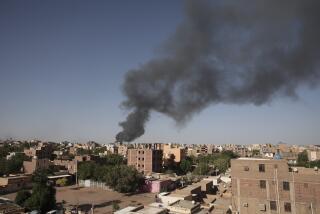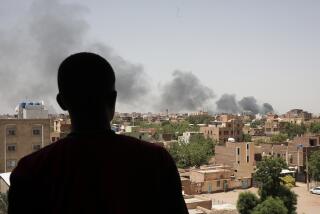5 U.S. Soldiers Killed, 24 Hurt in Somali Sweep
- Share via
WASHINGTON — At least five more American soldiers were killed and 24 others wounded during U.N. military operations in Somalia on Sunday--a toll that seemed certain to intensify pressures for the withdrawal of U.S. troops there.
The casualties came during another major U.N. military sweep in the area of south Mogadishu, the Somali capital, that traditionally has been controlled by fugitive warlord Mohammed Farah Aidid.
The Pentagon said two Army Black Hawk UH-60 helicopters also were “lost in action” during the operation, but officials said they had been unable to determine whether the aircraft had been shot down or crashed.
Sunday’s grim statistics brought the total number of American soldiers killed in Somalia to 16. One week ago, three American airmen were killed when their Black Hawk helicopter was hit by a rocket-propelled grenade fired by a Somali gunman.
U.S. officials said Sunday’s operation, which was continuing into the morning, had resulted in the capture of 20 members of Aidid’s Somali National Alliance, including a high-ranking official whom they did not name.
They said U.N. authorities in Mogadishu had imposed a news blackout, and the Pentagon would not have additional reports available until this morning. It is possible that both the death toll and the number of wounded may rise.
Sunday’s capture of the high-ranking official marked the second time in two weeks that a top Aidid lieutenant had been captured in such an operation. Two weeks ago, a similar sweep netted Osman Atto, Aidid’s No. 2 man.
President Clinton, in California to promote his health care plan, expressed sympathy over the deaths of the five U.S. soldiers, saying they had been engaged in “a vital humanitarian mission.”
At the same time, in a clear reference to Aidid’s continuing attacks, he warned that U.S. achievements in Somalia “must not be lost” because of reaction to Aidid’s challenges to U.N. authority.
Despite Clinton’s admonition, the latest round of setbacks seemed almost certain to intensify pressure in Congress for the United States to pull its forces out of Somalia in the face of increasing American casualties in Mogadishu.
The Senate demanded last month that the White House submit a detailed exit strategy for the American military effort in Somalia by Oct. 15 or face a possible cutoff of funds for the operation.
On Sunday, Sen. Bill Bradley (D-N.J.) told an audience on CBS’ “Face the Nation” program that the United States should “leave now” or face possible action by Congress.
And Senate Majority Leader George J. Mitchell (D-Me.), speaking later on Cable News Network, said he thought that Sunday’s incidents “clearly will increase the voices (in Congress) demanding withdrawal.”
But Mitchell said he personally did not believe that the United States should pull its troops out of Somalia.
Meanwhile, the Administration continued its efforts to seek a firm date for a possible American withdrawal, while at the same time staving off any actual troop pullout until Mogadishu is reasonably secure.
Speaking on “Face the Nation,” Defense Secretary Les Aspin rejected suggestions that the United States withdraw its troops immediately, arguing that it would lead to a general breakdown and a return of famine there. “We’re all looking for a date certain” to withdraw American forces, Aspin declared. “The trick is to withdraw . . . in a way in which at least enough security remains behind so that the famine does not return.”
Sunday’s action in Mogadishu was just the sort of guerrilla warfare--and continuing American casualties--that the Administration has feared since early this summer, when Aidid began attacking U.S. troops.
Aidid, a former Somali general, initially had cooperated with U.N. forces but later began challenging them after the United States withdrew the bulk of its forces early last May.
His guerrilla tactics have been intensified since early July, when the United Nations issued an arrest warrant for Aidid after his militiamen ambushed and killed 24 Pakistani peacekeepers.
The American troops killed or wounded in Sunday’s operation were members of the elite U.S. Ranger unit dispatched to Mogadishu in mid-August along with a contingent of Delta Force special operations forces.
Earlier Sunday, three U.S. Marines were wounded when the Humvee utility vehicle in which they were riding was blown up by a remote-controlled land mine, again presumably by Aidid forces.
The Marines were hospitalized; their injuries were not considered life-threatening, but their Somali driver was killed. U.N. officials said the Somali militiamen also suffered casualties.
U.S. Army Maj. David Stockwell, the U.N. spokesman in Mogadishu, termed the mine explosion “another in a series of unprovoked attacks” on American forces that have occurred since Aidid was declared a fugitive this summer.
As of late Sunday Washington time, Pentagon officials said it was impossible to determine whether the two Black Hawk helicopters had been shot down or had crashed for other reasons.
Aidid’s ability to elude U.S. forces has been a major source of frustration--and embarrassment--for the Administration, which had hoped to apprehend the general quickly once the United Nations declared him a fugitive.
More to Read
Sign up for Essential California
The most important California stories and recommendations in your inbox every morning.
You may occasionally receive promotional content from the Los Angeles Times.













